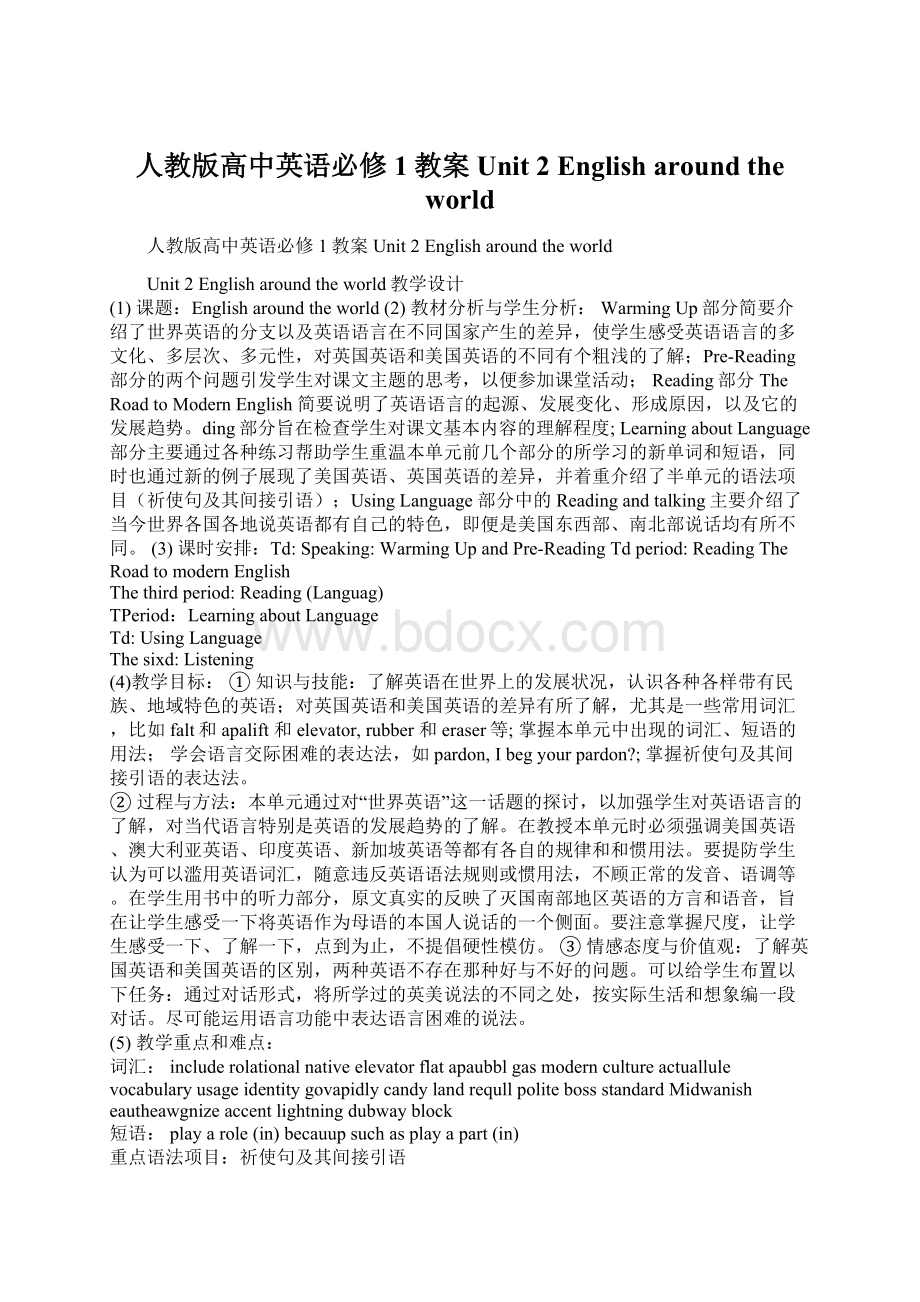人教版高中英语必修1教案Unit 2 English around the world.docx
《人教版高中英语必修1教案Unit 2 English around the world.docx》由会员分享,可在线阅读,更多相关《人教版高中英语必修1教案Unit 2 English around the world.docx(10页珍藏版)》请在冰豆网上搜索。

人教版高中英语必修1教案Unit2Englisharoundtheworld
人教版高中英语必修1教案Unit2Englisharoundtheworld
Unit2Englisharoundtheworld教学设计
(1)课题:
Englisharoundtheworld
(2)教材分析与学生分析:
WarmingUp部分简要介绍了世界英语的分支以及英语语言在不同国家产生的差异,使学生感受英语语言的多文化、多层次、多元性,对英国英语和美国英语的不同有个粗浅的了解;Pre-Reading部分的两个问题引发学生对课文主题的思考,以便参加课堂活动;Reading部分TheRoadtoModernEnglish简要说明了英语语言的起源、发展变化、形成原因,以及它的发展趋势。
ding部分旨在检查学生对课文基本内容的理解程度;LearningaboutLanguage部分主要通过各种练习帮助学生重温本单元前几个部分的所学习的新单词和短语,同时也通过新的例子展现了美国英语、英国英语的差异,并着重介绍了半单元的语法项目(祈使句及其间接引语);UsingLanguage部分中的Readingandtalking主要介绍了当今世界各国各地说英语都有自己的特色,即便是美国东西部、南北部说话均有所不同。
(3)课时安排:
Td:
Speaking:
WarmingUpandPre-ReadingTdperiod:
ReadingTheRoadtomodernEnglish
Thethirdperiod:
Reading(Languag)
TPeriod:
LearningaboutLanguage
Td:
UsingLanguage
Thesixd:
Listening
(4)教学目标:
①知识与技能:
了解英语在世界上的发展状况,认识各种各样带有民族、地域特色的英语;对英国英语和美国英语的差异有所了解,尤其是一些常用词汇,比如falt和apalift和elevator,rubber和eraser等;掌握本单元中出现的词汇、短语的用法;学会语言交际困难的表达法,如pardon,Ibegyourpardon?
;掌握祈使句及其间接引语的表达法。
②过程与方法:
本单元通过对“世界英语”这一话题的探讨,以加强学生对英语语言的了解,对当代语言特别是英语的发展趋势的了解。
在教授本单元时必须强调美国英语、澳大利亚英语、印度英语、新加坡英语等都有各自的规律和和惯用法。
要提防学生认为可以滥用英语词汇,随意违反英语语法规则或惯用法,不顾正常的发音、语调等。
在学生用书中的听力部分,原文真实的反映了灭国南部地区英语的方言和语音,旨在让学生感受一下将英语作为母语的本国人说话的一个侧面。
要注意掌握尺度,让学生感受一下、了解一下,点到为止,不提倡硬性模仿。
③情感态度与价值观:
了解英国英语和美国英语的区别,两种英语不存在那种好与不好的问题。
可以给学生布置以下任务:
通过对话形式,将所学过的英美说法的不同之处,按实际生活和想象编一段对话。
尽可能运用语言功能中表达语言困难的说法。
(5)教学重点和难点:
词汇:
includerolationalnativeelevatorflatapaubblgasmoderncultureactuallulevocabularyusageidentitygovapidlycandylandrequllpolitebossstandardMidwanisheautheawgnizeaccentlightningdubwayblock
短语:
playarole(in)becauupsuchasplayapart(in)
重点语法项目:
祈使句及其间接引语
难点:
Expressingone’sideaonwdofEngluldlearn;guaaker’scountrybylistening;howtotellthedbetweenacommandandarequest;howtochangunwhenturningthedd(6)教学策略:
Discuudent-centeredvocabulary,learning,listening,pairwork,teachgrammarinrealsituation(7)教学煤体设计:
Aandatader.(8)教学过程:
详见以下分课时教学设计。
(9)课堂练习与课外作业设计:
穿插于分课时教学设计中
(10)教学反思或值得改进的地方:
见每个课时最后部分。
Period1:
SpeakingWarmingUpandPre-Reading
Aims
Totalkaboutvaglish
TodiscusswhydosomanypeoplespeakEnglish
Procedures
I.Warmingup
1.Warmingupbyansweringaquestionnaire
1).TellthestudaregoingtoansweraquestionnaireaboutwarelearningEnglish.
2).Wwords:
Realearningaforeignlanguagboard:
3).Auduggestasmanyreasonsaaxample,forwork,asahobby,tolearnaboulavel,toreadliteratuginal,toreadresearchpagurftheIassexaWuggboardaa).Dividetheclaairs.
5).Giveouteachstudquestionnairepaper.
6).Explaask.Thestudentsmustquaaboulanguagelearningneeds(ormotivations).Tellatyouaregoingtotaquestionnairesad,andthatyou’dlakecleaItworksbwopawaptasks(quandanswers)aftereaquestionnaire.Iftheywaittilltheendtoswaudentmayuseupallavailable.
7).Wad,askacoupleofstudummaartners’answers.(Thismaydevelaclassdiscussionaboutlanguageneeds).
8).ThestudentswritefivlingaboutlearningEnglish.
9).Collquestionnaires.NeedsAnalysisQuestionnaire
Interviewer_______________
Interviewee_______________
Presentuse:
situationsandskills
(faxes,letters)
Listeningspeaking(telephoninggs,negotiaublicspeaking,socializing)
Writing(faxes,letters)
Futureuse:
expectationsamb后反思:
本课能比较好地完成教学目标,训练了学生说的能力,懂得如何表达自己的思想和意见。
使学生了解了世界各地的英语是有所不同的,特别是了解英国英语和美国英语的区别。
同时使学生感受到学习英语的重要性。
由于学生的口语水平有限,所以探讨的时候不是很深入。
Period2Reading:
TheRoadtomodernEnglish
Aims
TotalkaboutEnglish
Toreadabouglishlanguagg
Readquicklytogainideaxt.
Luddouachparagraphoraummaaachparagrawnwords.
Paragraph1:
Thespreadglishlanguagworld
Paragraph2:
Nativespeakercanunderstandeabuaynotbeabletounderstandeverything.
Paragraph3:
AlllanguageschangewhencultuunicatewaParagraph4:
EnglasaforeignlanguagdlanguageinAfricaandplacew:
Asia
pla2Scanning
ReadtolocateparticulaationandcompldingExdinganswx(page10
2.Answqu(Page11)
Workingroups.Discuwoquandthenasktwogrouanswlass.
1).DoyouatterswhatkindofEnglishyoulearn?
Why?
Possibleanswer:
Idon’Hereaasons:
★Nativespeadaworldhavenodifficultyinunderstandingeadactthaakabitdly.
★IaryforustoleaarrowdbetweenddsofEnglishifwunicatefluentlywithnativespeaglallovertheworld.
★DdsofEnglishhavethesamelanguagIfyouhavegotagoodcommandd,youwillalmosthavenodifficultyunderstandingadofEnglish.
(Anypersuasiveandsupportingreaudentsgivecanbeaccepted.)
2)WhydoyouleallovertheworldwanttolearnEnglish?
Possibleanswer:
ThereasonswhypeopleallovertheworldwanttolearnEnglish:
★Wglobalizaglishhasbbestbridgvethepuleallovertheworldcommunicatingwa★However,likeallmajorlanguagworld,Englishisalwayschanging.InordertoadjusttonativespeadaworldamuleallovertheworldtolearnEnglish,wglishspeakingcou-Englishspeakingcou★AllefromdaworldspeakEnglishwithvariousaccentanddialects,andpeoplehavetolearnaboutthedbetweenddsofEngldertoavoidmisunderstandingwhilecommunicating.
课后反思:
本课是阅读课。
英语阅读教学是高中教学的重中之重。
许多英语教师对阅读训练也给予了足够的重视,但是在训练方式上却存在较多的问题。
多数教师过分注重语法结构的分析和句子的机械翻译而忽视技巧培养。
只有在阅读教学中教给学生一些学习策略,培养阅读技巧,才能让学生有可能通过课外自学来扩大知识的摄取量,从而弥补课堂英语阅读教学的不足。
由于时间仓促以及学生口语水平的局限,本课时在学生让学生讨论的环节上,气氛不够热烈,讨论时间不足,今后应尽量鼓励学生多开口说英语,以弥补这方面的缺陷。
Period3:
Reading(Languag)
Aawordsandphraludev.
a)contain
eg.Tludesbothhouseandfurniture.
b)embracethingaspartofwholeeg.Iincludehimamongds.2a)adj:
beingathand;beingnow出席的,在场的;现在的,当前的该词可做前置定语也可做后置定语,当它做前置定语其义为“现在的”,做后置定语其义为“出席的”
eg.Tbers现在的成员Thememb在场的成员b)n:
gift
eg.Hgavghbor'skidslittl)vt:
赠送,呈献[(+to/with)]
eg.Tdhimwithabulowulture
n:
[C][U]understandingofliterature,art,mug.Hehasstudiedthecultuanywu.id:
whoorwhatagis
eg.Youshouldshowyouridardbu.rule
a)n:
cuatementaboutwhatmustnotbedone
eg.He’smadeitarularly.
It’sagaullb)vt:
togovl
c)eg.Thequeenruledhercou20years.
6.Request
vt:
toag.Theyrequestedfinancialsupport.
注意:
这个词所接的宾语从句要用虚拟语气
Irequestedthathe(should)comeanhourearlier.
B)n:
askingorbeingasked
eg.Mr.PainemadearequestthatIshouldheland
a)vt:
giveordg.Icommandyoutostarta注意:
这个词所接的宾语从句要用虚拟语气
Icommandthatyou(should)startab)n:
ordereg.Theavedand.Actuallyadv
eg.Shelooksyoung,butshe'sactually50.
Didyouactuallbreakthewindow?
9.Internationaladj:
ofrelatingvolvingtwuworld国际的
eg.Theyaredealingwationalaffairs.ManyAfricancouvedinternationalhelp.10.modernadj:
g.ThisisabdTamodal.11.vocabularyn:
allthewordsoflanguage
eg.Widereadingwillincreaseyourvocabulaglishvocabularyislimited.12.rapidlyadv:
quickly
eg.Ourcountrydevelopsrapidly.ThenumberoflearningEnglasingrapidlllv:
tellgg.Canyouretellurownword?
Theteacheraskedyoullgnizev:
toidviousexg.HelookedavelopeandrecognizedJenny'shandwritingimmediately.
Thepolicemanrecognizedherasagov:
groupwhichgovernacouacertainarea
eg.Thegovwilldecidethematter.
Thegovdiscussingblem.
Usefulexlayapart/rolein:
toabeinvolvedinanactivity
eg.Hehasplayedaantpartincarryingoutthewholeplan.
Englishplaysaantrolationalcommunication.
2.becauseof:
byreabg.Becaudidn'tgbecauseof与because的区别,前者后接名词或代词,后者接句子
eg.Hedidn’tglbecausehewasill.Hedidn’tglbecaullness.3.comeup
eg.Shecameupandsaid,"Gladu."
Tameupgradually.
I'lllwifanythingcomesup.
4.suchas:
like;forexample
eg.Ilikedrinkssuchasteaanduchas与forexample的区别,前者用来罗列事物或人后者用来举例说明
eg.Englishisalanyplaces,suchasAfricaand.
Forexample,Tomhasthesa后反思:
本节课是课文知识点的传授。
着重讲解课文中重要单词和短语的运用。
不足之处,教学设计任务比较单一,练习不多。
Period4:
LearningaboutLanguage
(Ind(II)requestscommands)
Aims
TodiscoverusefulwordsandexTodiscoverusefulstructures
Procedures
I.DirectandIndDIndlHesaid,“Igleveryday.”
simplepast
Hesaid(that)hewleverydalepaHesaid,“Iwleveryday.”
paHesaid(that)hehadgleverydaHesaid,“Ihavegleveryday.”
paHesaid(that)hehadgleverydagressive
Hesaid,“Iamgoingleveryday.”
pastprogressive
Hesaid(that)hewasgoingleveryday.
pastprogressive
Hesaid,“Iwasgoingleveryday.”gressive
Hesaid(that)hehadbeengoingleveryday,
future(will)
Hesaid,“Iwillgleveryday.”
would+verbname
Hesaid(that)hewouldgleveryday.
future(goingto)
Hesaid,“Iamgoingleveryday.”gressive
Hesaid(that)heisgoingleveryday.
pastprogressive
Hesaid(that)hewasgoingleveryday
DIndauxiliary+verbname
Hesaid,“Doyougleveryday?
”
Hesaid,“Wheredoyougl?
”
simplepast
HeaskedmeifIwleveryday.*
HeaskedmewhereIwlative
Hesaid,“Gleveryday.”ve
Hesaidtogleveryday.
DIndl+simplHesays,“Igleveryday.”
simpl+simplHesays(that)hegleveryda+simplHehassaid,“Igleveryday.”+simplHehassaid(that)hegleveryday.
pastprogressive+simplepast
Hewassaying,“Iwleveryday.”
pastprogressive+simplepast
Hewassaying(that)hewleveryday.
pastprogressive+paHewassaying(that)hehadgleveryday.
DIndan
Hesaid,“Icangleveryday.”
could
Hesaid(that)hecouldgleveryday.
may
Hesaid,“Imaygleveryday.”
might
Hesaid(that)hemightgleveryday.
might
Hesaid,“Imightgleveryday.”
must
Hesaid,“Imustgleveryday.”
hadHesaid(that)hehadtogleveryday.
havHesaid,“Ihavetogleveryday.”
should
Hesaid,“Ishouldgleveryday.”
should
Hesaid(that)heshouldgleveryday.
ougHesaid,“Ioughttogleveryday.”
ougHesaid(that)heoughttogleveryday.
DiscoveringusefulwordsandexWairs.Doex2,3and4.Tansweryou’reyourclassmates.Theteacherheludentsdiscoverthed2.Playthetaudlistenandaaandintonation.Thenpraadinginpairs.